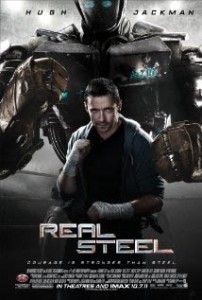 Technically, Real Steel isn’t my kind of movie. I mean, sure, it has fighting robots, and battles between giant mechanized men are totally my thing. Violence. Futuristic technology. Yay!
Technically, Real Steel isn’t my kind of movie. I mean, sure, it has fighting robots, and battles between giant mechanized men are totally my thing. Violence. Futuristic technology. Yay!
Except, Real Steel relies on the “cute kid” plot device and a story that’s designed to tug at one’s heartstrings. Teeny problemo: I don’t have heartstrings. Movies that others find heartbreaking and compelling, strike me as sappy and painfully obvious. As for kids…they’re like adults. Some children are absolutely charming; others are assholes; most just exist. I really dislike big-eyed urchins who I’m supposed to love because they are big-eyed urchins.
That said, I really liked Real Steel.
Real Steel is the story of a down-on-his-luck boxer turned battle robot owner who is thrust into role of father to the son he’s merrily ignored for eleven years. The movie’s underlying premise is that in the future (which looks a lot like now), boxing and other forms of human sport fighting has been outlawed. The public’s appetite for violence is sated with huge, high-tech Rock em Sock Em robots.
Charlie Kenton’s (Hugh Jackman) career in fighting robots is stuck so hard in the toilet, you’d need Roto-Rooter to get it out. Instead of battles in big city arenas, Charlie is reduced to hauling his battered robot to shit-kicker rodeos in the middle of redneck nowhere to battle the local livestock. In the first action sequence, Charlie’s robot flings a black bull across an arena, to which my husband noted, “PETA must not be around anymore.” The bull, however, gets its revenge when Charlie, distracted by a hillbilly hottie, stomps the robot into a pile of scrap.
Charlie, already up to his eyeballs in debt, sweeps up what’s left of his bot and high tails it out of town. But before he leaves, he encounters a couple of men who deliver the news that his ex-girlfriend, his son’s mother, has died. Charlie needs to sign paperwork relinquishing his parental rights to the boy’s aunt. Charlie, never one to pass up an opportunity, blackmails the aunt’s husband–her wealthy husband. Charlie agrees to take the kid for a few months, so auntie and hubby can go to Europe, in exchange for all his rights to the boy, and 100 grand.
Enter the kid, Max (Dakota Goyo). This is where the movie might have turned into a sappy, crapfest faster than a supped-up battle robot could bust your jaw. The script could have opted for a curly haired cherub with a heart of gold who teaches Charlie the meaning of love, cute kittens, lollipops and other schmaltz. Instead, we get Max, a smart ass who sees right through Charlie. Seconds into their meeting, Max asks how much his uncle paid Charlie, and then succinctly describes the transaction as, “…you sold me.”
Fortunately, Max and Charlie have a passion in common: fighting robots. Max uses this commonality to work his way into his father’s heart, not with cloying childlike innocence, but with snarky, blunt emotional force, because, really, that’s the only thing a guy like Charlie understands.
After yet another disaster, created by Charlie’s terminal hubris and leap-before-you-think approach to life, Charlie and Max find themselves digging around a robot junkyard, searching for anything that can resurrect Charlie’s dead prospects. This is where Max stumbles upon Atom, the little robot that could. And the stage is set for the inevitable battle between Atom and Zeus, the shiny multimillion dollar colossus. Zeus doesn’t clank when it moves, it hums, Cylon-style, so you know it’s the baddy.
Make no mistake, Real Steel is moving toward a predictably happy ending. The plucky little robot will overcome the metal Goliath. Father and son will forge a deeper relationship and along the way Dad will get his shit together.
Sort of…
Atom’s victory is largely with the audience, on screen and off. Anyone with an ounce of understanding of human nature knows that Charlie is still Charlie. He’s destined to always be a few steps ahead of the bill collectors and he’ll never be the kind of father who shows up for his son’s baseball games. (Of course, Max probably isn’t the Little League kind of kid, anyway.) The movie doesn’t bother to resolve all the issues, which is wise, because the crap between Charlie and Max is piled deep and any resolution, at least the kind that can be squeezed into an hour and sixty minute movie, would strain credulity.
Real Steel is like the rare gambler who has the good sense to quit when he’s ahead. It doesn’t clog up the narrative with epilogue after epilogue. It ends at a high point and leaves it to the viewer to decide where Charlie and Max end up next.
My only complaint with Real Steel is that Charlie’s transition from asshole to lovable curmudgeon progressed too easily. But Hugh Jackman eats up so much scenery that the hitch in characterization is easy to ignore. (I admit, I could probably listen to Jackman read the financial section in the paper and be a happy camper.)
Recommended.


